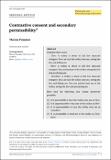Files in this item
Contrastive consent and secondary permissibility
Item metadata
| dc.contributor.author | Pummer, Theron | |
| dc.date.accessioned | 2022-06-13T07:30:08Z | |
| dc.date.available | 2022-06-13T07:30:08Z | |
| dc.date.issued | 2022-06-12 | |
| dc.identifier | 279576606 | |
| dc.identifier | cba8e6cc-7b51-49c3-b3d0-aa33d5b2bfdd | |
| dc.identifier | 85131666759 | |
| dc.identifier | 000809618500001 | |
| dc.identifier.citation | Pummer , T 2022 , ' Contrastive consent and secondary permissibility ' , Philosophy and Phenomenological Research , vol. Early View . https://doi.org/10.1111/phpr.12897 | en |
| dc.identifier.issn | 0031-8205 | |
| dc.identifier.other | ORCID: /0000-0003-0147-9917/work/114641483 | |
| dc.identifier.uri | https://hdl.handle.net/10023/25519 | |
| dc.description.abstract | Consider three cases: Turn: A trolley is about to kill five innocent strangers. You can turn the trolley onto me, saving the five and killing me. Hurl: A trolley is about to kill five innocent strangers. You can hurl me at the trolley, saving the five and paralyzing me. TurnHurl: A trolley is about to kill five innocent strangers. You can turn the trolley onto me, saving the five and killing me. You can instead hurl me at the trolley, saving the five and paralyzing me. Most find the following four claims intuitively plausible: (1) It is permissible to turn the trolley onto me in Turn. (2) It is impermissible to hurl me at the trolley in Hurl. (3) It is impermissible to turn the trolley onto me in TurnHurl. (4) It is permissible to hurl me at the trolley in TurnHurl. But how does turning go from permissible to impermissible, and hurling from impermissible to permissible, when both alternatives are available? I argue that such “secondary permissibility” claims are explained by contrastive consent. Even if I do not consent to being harmed, it is likely I'll consent to being hurled at the trolley rather than being turned onto. | |
| dc.format.extent | 15 | |
| dc.format.extent | 272455 | |
| dc.language.iso | eng | |
| dc.relation.ispartof | Philosophy and Phenomenological Research | en |
| dc.subject | B Philosophy (General) | en |
| dc.subject | T-NDAS | en |
| dc.subject | MCC | en |
| dc.subject.lcc | B1 | en |
| dc.title | Contrastive consent and secondary permissibility | en |
| dc.type | Journal article | en |
| dc.contributor.institution | University of St Andrews. Centre for Energy Ethics | en |
| dc.contributor.institution | University of St Andrews. Centre for the Study of Philanthropy & Public Good | en |
| dc.contributor.institution | University of St Andrews. Centre for Ethics, Philosophy and Public Affairs | en |
| dc.contributor.institution | University of St Andrews. Philosophy | en |
| dc.identifier.doi | 10.1111/phpr.12897 | |
| dc.description.status | Peer reviewed | en |
This item appears in the following Collection(s)
Items in the St Andrews Research Repository are protected by copyright, with all rights reserved, unless otherwise indicated.

